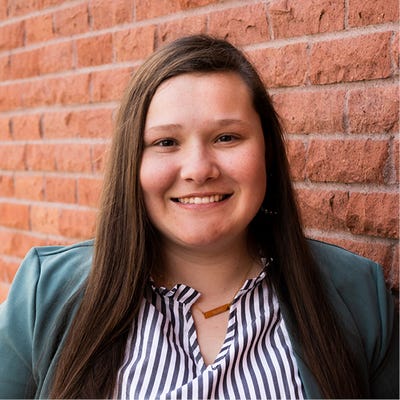
Before 2022, students that were home-schooled in Nebraska were unable to be involved in FFA. However, that changed as the new Nebraska Ag Academy started.
With this chapter, students can compete in different contests, participate in a Supervised Agriculture Experience (SAE) and take online agriculture classes.
Even though the format of ag education might look different, these students are able to create an FFA experience that is tailored to their interests. The transformative impact that this program has on students has been shown in these two years as the program has grown from eight to 26 students.
“Building those connections within my chapter has been really amazing,” says Lilee Chevalier, a senior Nebraska Ag Academy member. “I do not think I have ever loved a whole group of people so fast.”
Impact for a lifetime
Many ag education students are greatly affected by their ag teacher. This is no different for the students in the Nebraska Ag Academy.
“Just a shout-out to our teachers. They have made this so wonderful to be a part of and made our chapter really feel like a community and not just an online classroom,” Chevalier says. “That takes a lot of effort from the teacher to connect us and have our weekly Zoom meetings and our chapter meetings every month, so they really make it as amazing as it is.”
Chevalier is from Lincoln, Neb., and has been able to pour more time and energy into her SAE because of the hybrid learning environment.
Her SAE is in beef production entrepreneurship, where she runs a small-scale cattle feeding operation. She works hand in hand with her local cooperative to buy feed and borrows money from her parents until she markets the beef.
Another innovative SAE that is happening in the Nebraska Ag Academy chapter is Olivia Beel’s project. Beel received a scholarship to buy 200 chickens and 27 ducks. She then started to sell the eggs from her flocks to customers in the community. But that came with a few challenges.
“Lining up customers was really challenging, and she recognized that right away,” says Breann Zimmer, co-advisor of the Nebraska Ag Academy. “She ended up talking with two grocery stores up in the Valentine-Johnstown-Ainsworth area, and she started selling her eggs there. That completely mitigated the challenge of chasing customers down.”
Building the program
“No matter if you're home-schooled or in a classroom, a lot of people think inside the box with the curriculum that we have,” Zimmer says. “At academy, we actually encourage students to get outside the house and get outside with their animals.”
While there are other programs across the state that have ag education available for home-schooled students, Zimmer and the Nebraska Ag Academy did not model after any of these chapters.
“There are a couple of states that are doing something similar to the Nebraska Ag Academy, but really many are just waiting for the right setup,” says Stacie Turnbull, the Nebraska state director of agricultural education.

HANDS-ON OPPORTUNITIES: Mahaya Jones is a sophomore from Leigh, Neb., and is the secretary for the Nebraska Ag Academy. Here, she is seen judging market lambs at the Nebraska FFA Convention, where her team placed third. (Elizabeth Hodges)
Zimmer was able to draw upon her three years of experience teaching high school agriculture in the public school to start formulating curriculum for her students.
“I molded what I had in my classroom and brought it into more of an online perspective,” Zimmer says.
But the impact of this innovative education format is seen even from the state level.
“Breann Zimmer really has made it her goal to make sure that students have a quality agriculture education experience and get to join in on that leadership aspect of FFA,” Turnbull says. “She is doing a fantastic job.”
Filling the void
“I think as a nation, we've really seen the number of home-school families increase since COVID,” Turnbull says. “So, I think there's a growing opportunity there.”
But it is not just home-schooled students who can benefit from this program.
“There is an opportunity for schools that don't have FFA and that don't offer agricultural education,” Turnbull adds.
When chapters reach out to Turnbull because they are having a hard time filling a position in a chapter, she can direct them to the Nebraska Ag Academy for classroom content. Here, they will still be able to get a high-quality education while waiting for a teacher to fill that role.
An integral part of ag education programs across the nation is the three-circle model. One circle represents instructional time in the ag classroom. The next circle represents the student’s SAE. This includes students getting involved in the industry in many ways. The last circle represents FFA, where they can compete in different contests to showcase their knowledge.
“So, all of [Zimmer’s] students have to meet the same requirements as any other students taking that as a member of agriculture education and FFA in Nebraska,” Turnbull explains.
While this might not be a traditional form of education, the opportunity for more students to be involved in agriculture is possible with this program.
“The point is really to make sure that we are assisting to provide that high-quality educational experience for all students,” Turnbull says. “Also to make sure that all students have access to something very important, which is agriculture education."
Learn more about the Nebraska Ag Academy at neagacademy.com.
About the Author(s)
You May Also Like






